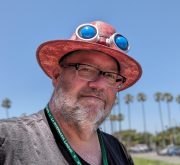The Dangers of Writing on Someone Else’s Heartstrings
by Marie Croke
Editor’s note: This piece is part of a rolling series, Writing from History, in which creators share professional insights related to the work of using historical elements in fictional prose.
As speculative fiction authors, we twist and remake reality. Yet, when it comes to retelling events or using fiction to manipulate a real-life person’s biography, those places we’re remaking were someone’s home, those events were often the worst days of someone’s life, and those people were someone’s grandmother, cousin, child, whose memories could still be very much alive.
No one is exempt from the pain of having someone shove their hands in your memories, in your home, your life. No one. Not even you.
As an example, during high school I had an English teacher, Ms. Lake, who assigned her students a creative exercise: make an etching of a gravestone, then write a story about the deceased.
After school, I stopped at a local graveyard. There, I paid respect to a particular grave that shares my last name. Then I sought out the oldest grave, one with a name I suspected would be as unknown to my peers as it was to me, and made my etching. When Ms. Lake asked for volunteers to read their creative exercises out loud, I, terrified of public speaking, was not a volunteer.
Then I went about my day normally, completely ignorant of what happened two periods after.
You see, another student had gone to that same graveyard. Had made her etching less than thirty meters from where I’d made mine. And she was not afraid of public speaking. Not at all. She stood in front of twenty-five of my peers and told a story. About a little girl buried just the year before. A sister. A younger sister. Of mine. Four years old. Died of leukemia.
I finished my day. Stepped outside school. And was promptly pulled aside by Ms. Lake, who asked me: “Did you have a sister die last year?”
No warning. No lead-up. Nothing but an abrupt, dismissive comment on a cold field. Put on the spot, I managed to whisper, No. She’d been my niece.
“Oh, did she die of leukemia?”
I choked out another No. But I didn’t go on.
I didn’t tell her my niece had cerebral palsy, that her lack of coordination had caused her to fall, that she’d been rushed to the emergency room when it became apparent she was more uncoordinated than normal, that she’d had a blood clot that reached her brain. That there was nothing the doctors could do. That my family was wrecked.
I didn’t tell her because it wasn’t any of her business.
Ms. Lake laughed. Said that the other student had gotten it all wrong. Then she walked away, leaving me to wonder how many people had been privy to a false narrative about someone I loved.
As if she’d been a game, a plaything to steal, to twist, to remake.
Sometimes events and people will call you to write about them, but if or when that occurs, consider the following steps to approach your fiction writing respectfully. This approach will allow you to do what you do best—creatively play—but within the parameters of human empathy.
1) Seek out interviews. Speak to the people associated. Show the depth of your care. The passion you have is precious if coming from a fascinated and loving space. Your attention to detail and your questions can create a bond rather than a schism. Human beings crave connection and understanding. Give people those, and they are far more likely to be open to your ideas.
2) Request permission. Just as you would ask to photograph someone on the street, ask to write about their pain and then respect their decision. Some events aren’t meant for you to write about, especially in the cases of situations outside your culture or home. Some people aren’t yours to take liberties with.
Many authors will use others’ stories as inspiration for their own tales, changing names and locations to ease themselves around the “all persons fictitious” disclaimer that many works use to protect themselves from libel. Others will consider their everyday acquaintances as free-game character fodder, believing that those acquaintances will never know and that ignorance suffices.
If you’re too afraid to ask, then maybe the story percolating in your mind isn’t for you to write.
3) Respect boundaries. If you are given permission, the next step is to be sure you’re listening to the limits. And there will be limits. Compare this type of fictitious writing to narrative nonfiction, where journalists respect anonymity or refrain from sharing more intimate parts of stories relayed to them. Don’t give in to the presumption that because you can, you should.
4) Consider the effect of your creative decisions. Not just on your story’s plot or on the characters you’re borrowing, but on readers. It’s easier to write about people who have long ago died; it’s a much more dangerous endeavor to dive into stories concerning more recent situations.
We’re often told to write without editors in mind, but in this specific case, I believe in bending that rule. Think about how the changes you enact will affect others. When crafting a story about an event that impacted a multitude of people, it’ll be far more difficult to consider everyone’s view, but by checking ourselves, making sure we’re coming at the situation with the kindest hearts and respectful words, we’re likely to craft a story that is far more meaningful. Given the fact that tragic events tend to be more attractive to write about than happier ones, this advice is particularly important.
I know that you will use your daily life as inspiration, and that includes both painful, awful situations all around the world and the minutia closer to home. All I ask is that you remember respect. Don’t stand up in front of your peers and readers and write creative lies about someone else’s grief. Don’t presume you know someone else’s family or culture or home. Don’t perpetuate pain when you can immortalize kindness.
 Marie Croke is a fantasy & science-fiction writer with over 40 stories in publication. She is a graduate of the Odyssey workshop, first place winner in the Writers of the Future contest, and her work has been published in Beneath Ceaseless Skies, Apex Magazine, Diabolical Plots, Fireside, Flash Fiction Online, and Cast of Wonders among many other fine magazines and anthologies. She has worked as a slush editor for multiple magazines, including khōréō, and has written reviews for Apex Magazine. She is now an Acquisitions Editor at Dark Matter INK. She lives in Maryland with her family and enjoys crocheting, kayaking, and aerial dancing in her free time.
Marie Croke is a fantasy & science-fiction writer with over 40 stories in publication. She is a graduate of the Odyssey workshop, first place winner in the Writers of the Future contest, and her work has been published in Beneath Ceaseless Skies, Apex Magazine, Diabolical Plots, Fireside, Flash Fiction Online, and Cast of Wonders among many other fine magazines and anthologies. She has worked as a slush editor for multiple magazines, including khōréō, and has written reviews for Apex Magazine. She is now an Acquisitions Editor at Dark Matter INK. She lives in Maryland with her family and enjoys crocheting, kayaking, and aerial dancing in her free time.



